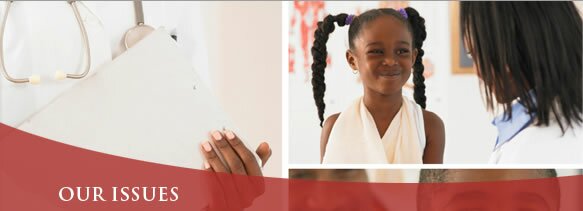Voting Rights
Overview
Since the election of President Barack Obama in 2008, many states throughout the country have enacted or proposed strict voting laws that impose unfair restrictions on eligible voters across the country. It has been estimated that block the vote efforts through restrictive voting legislation could prevent as many as 5 million people from registering to vote and/or casting a ballot this election year.
 Since the beginning of 2011, 176 restrictive bills regarding voting laws have been proposed in 41 states total and to date, 14 states have already passed restrictive voting laws. Of these, at least 34 states have introduced laws that would require voters to show photo identification in order to vote, and 7 states have already passed and signed into law legislation requiring some form of voter identification legislation.
Since the beginning of 2011, 176 restrictive bills regarding voting laws have been proposed in 41 states total and to date, 14 states have already passed restrictive voting laws. Of these, at least 34 states have introduced laws that would require voters to show photo identification in order to vote, and 7 states have already passed and signed into law legislation requiring some form of voter identification legislation.
Before the 2006 elections, no state had voter identification laws, either to register to vote or to vote at the polls on Election Day. At least 12 states have introduced laws that would require proof of citizenship, such as a birth certificate, to register to vote or to cast a ballot. Additionally, at least 13 states have introduced bills to end Election Day and same-day voter registration, limit voter registration mobilization efforts, and reduce other registration opportunities.
“For the People” Voter Protection Initiative
 The CBC is particularly vested in the issue of voting rights because it has been a historically relevant and important issue in our community. Moreover, not only is voting a fundamental right of American citizens, but restrictive voting laws disproportionately affect minorities, the elderly, the young, and low-income communities. Voter ID laws specifically have a highly disproportionate impact on these communities. While 11% of all American citizens lack photo ID, a whopping 25% of African Americans lack photo ID. Moreover, 15% of those earning less than $35,000, 18% of citizens over 65, and 20% of voters ages 18-29 lack photo ID.
The CBC is particularly vested in the issue of voting rights because it has been a historically relevant and important issue in our community. Moreover, not only is voting a fundamental right of American citizens, but restrictive voting laws disproportionately affect minorities, the elderly, the young, and low-income communities. Voter ID laws specifically have a highly disproportionate impact on these communities. While 11% of all American citizens lack photo ID, a whopping 25% of African Americans lack photo ID. Moreover, 15% of those earning less than $35,000, 18% of citizens over 65, and 20% of voters ages 18-29 lack photo ID.
During this election year, the CBC is doing all it can to to protect votersʼ rights and to ensure that no eligible voter is turned away from the ballot box. Our members are doing everything from speaking out vocally against restrictive state voting laws, to proposing federal legislation to maintain access to the ballot box, and working with outside organizations to educate voters on the voting laws within their states.
On September 25, National Voter Registration Day, Congressional Black Caucus Members will host a series of voter information and voter registration events in communities across the country to make sure all eligible voters are registered and prepared to vote this fall. A list of participating members and locations will be available in mid-September. Click here to learn more.
Faith Leaders Summit
For many Americans, the right to vote was not simply handed out, but won through hard-fought battles. To continue this fight, the CBC invited hundreds of our nation’s faith leaders to
gather in Washington, DC for the Congressional Black Caucus’s inaugural Faith Leaders Summit, in conjunction with the Conference of National of Black Churches. During the summit, Faith Leaders heard from the Congressional Black Caucus and voting rights experts to discuss the dangerous new state voting laws.
The Black Church has diligently served our community for over 200 years fighting for freedom, justice, and equality when African Americans had nowhere else to turn. Forty one years ago, the Congressional Black Caucus was founded “to positively influence the course of events pertinent to African Americans and others of similar experience and situation.” In years since, we have earned the moniker “the Conscience of the Congress” because of our unyielding commitment to our communities and our country. Due to the rising number of state governments across the country that have enacted an array of new laws, making it harder to register and to vote, the Congressional Black Caucus has been called duty again. This time we partnered with leaders in our Faith Community.
See the full agenda from the Faith Leader’s Summit here.
